- Home
- Daniel Woodrell
Tomato Red
Tomato Red Read online
Table of Contents
Praise
By Daniel Woodrell
Title Page
Foreword
Epigraph
Chapter 1 - Theme Park of Fancy
Chapter 2 - Tuxedo Swallowed
Chapter 3 - Double Everything
Chapter 4 - Don’t Fun Me
Chapter 5 - All That Human Juice
Chapter 6 - Lain Unrepaired and Become
Chapter 7 - Transferred to a Period
Chapter 8 - Bleed toward the Beach
Chapter 9 - That’ll Make Five
Chapter 10 - Spared the Expectation
Chapter 11 - Whoop
Chapter 12 - So-so Desire
Chapter 13 - Fuss and Feathers
Chapter 14 - It’s Medical Tonight
Chapter 15 - As Far as Time Goes
Chapter 16 - Belong to a Reason
Chapter 17 - Him Needs
Chapter 18 - Soap and Pudding
Chapter 19 - Rock Pavilions
Chapter 20 - Pretty International
Chapter 21 - Haunt and Run Me Ragged
Chapter 22 - Skull and Rags
Chapter 23 - Your Head in Dollars
Chapter 24 - Hang the Blame
About the author
Copyright Page
Acclaim for Daniel Woodrell and TOMATO RED
Winner of the PEN West Award for the Novel
“Woodrell’s storytelling is as melodic, jangly, and energetic as a good banjo riff . . . If one is tempted to hear the echoes of William Faulkner, or Erskine Caldwell . . . no matter. Mr. Woodrell isn’t imitating any of them. He’s only drawing from the same well they did, but with a different take, a different voice, a sharper sense of irony.”
—The New York Times Book Review
“Beyond the savory hill-tones, the bite, the warmth, the cadences that link the Appalachian tongue to an older English treasure, Woodrell is also writing pastoral, an invocation of green hills, red dirt, and sagging wooden structures in the hollows.”
—Los Angeles Times Book Review
“Woodrell’s down-home version of Chandleresque prose lends a near-Biblical dignity to the criminal doings.”
—The New Yorker
“Wild and poignant . . . smart and melancholy . . . Plot is secondary to character in Woodrell’s luminous books, and it’s part of the writer’s gift that his people, born losers all, are steeped in credible dignity.”
—San Jose Mercury News
“Erskine Caldwell with a double shot of irony . . . [Woodrell] writes some of the funniest, most lyrical, most marvelously double-edged prose being written by anyone on any side of town, in any genre, high or low. Take Elmore Leonard’s grit, Barry Gifford’s wild heart, James Crumley’s mean streak, and a wisp of Truman Capote’s lyricism, and you’re ready to visit the Ozarks, Woodrell-style.”
—Booklist (starred review)
“[Woodrell’s] writing sure goes down smooth and easy.”
—Carl Hiassen, The Washington Post
“Woodrell has the gift . . . An exhilarating writer.”
—Philadelphia Daily News
“A rollicking and buoyant book.”
—The Village Voice
“Woodrell has tapped into a novelist’s honesty, and lucky for us, he’s remorseless that way.”
—Los Angeles Times
“One fine, startling, disturbing novel . . . Mr. Woodrell’s prose is crisp and clean.”
—Austin Chronicle
“Woodrell’s novels veer, sometimes brilliantly, between burlesquing the genres they ostensibly inhabit and investing them with an exceptional authenticity . . . Extraordinarily readable . . . Tomato Red both showcases and consolidates Woodrell’s casual mastery of his idioms.”
—The London Review of Books
“Tomato Red made me laugh, made me shake my head in amazement, but most of all it made me bloody envious. Modern crime fiction is thick with storytellers, but Daniel Woodrell is that rare beast: a writer.”
—Roger Smith, author of Mixed Blood and Wake Up Dead
“Three pages into Tomato Red I got that inexplicable head rush that comes from wondering how I’d never heard of the book or of Daniel Woodrell, and regretting the years I was ignorant of both. Woodrell writes with a poetic, lyrical, breezy style that reminds me of authentic country artists like George Jones or Hank Williams but he somehow does it on the page. He packs an entire world into a short book and leaves you yearning for more. Thank you, Busted Flush Press, for introducing me to Woodrell. Now others won’t make the mistake I made.”
—C. J. Box, Edgar-winning author of Nowhere to Run
“Tomato Red is something remarkable and extraordinary . . . a fiery book . . . Woodrell’s fiction is first-rate; he writes tough and true, without apology or regret.”
—The Oxford (Mississippi) Eagle
“Woodrell’s people live out there in that world of rare fiction that is realer than real.”
—Robert Campbell
“Funny, poignant, deeply affecting, untamed, and wild, wild, wild.”
—The Detroit Metro Times
“Lyrical . . . a perfect slice of country noir . . . Daniel Woodrell is one of the major discoveries of the last decade.”
—Time Out London
“Woodrell’s South, like his prose, is complex and ironic; it is as beautiful and full of love as it is violent and self-destructive.”
—The Bloomsbury Review
“Before you begin Daniel Woodrell’s sizzling Tomato Red, strap yourself into your chair. The story starts with a firing-off-the-line, hell-bent-for-leather sentence that leaves readers breathless, laughing, and begging for more speed . . . Noir master Raymond Chandler once said that ‘good prose should be lean, racy, and vivid.’ Like all of Woodrell’s fiction, Tomato Red has these in spades.”
—BookPage
“In his latest, Woodrell does to common Ozark English what barbecue masters do to a tough cut of meat. He smokes it with a combination of raw and rich words, tenderizes it, spices it up until it’s mouthwatering.”
—The Kansas City Star
“Scathingly funny . . . Sammy’s first-person narration swings to the beat of Southern fable. Woodrell’s language blends the exaggeration of front-porch lie swapping, the visceral lament of the blues, and the apocalyptic, lyrical bent of the King James translation of the Good Book itself. There’s hardly a dull line in the entire enormously entertaining romp.”
—The Lawrence (Kansas) Journal-World
“It’s like being behind the wheel of a stolen car on a drunk night-run down the snake-backed highway through the Ozarks from Kansas City to Little Rock . . . This looks like breakout time for Woodrell. Hop on his bandwagon now before it gets too crowded.”
—Playboy Online
“Zooms on the rocket fuel of Woodrell’s explosively original language.”
—The Washington Post Book World
“Genius is a word that gets thrown around a little too much these days, but when it comes to Daniel Woodrell, it’s nearly an understatement.”
—Reed Farrel Coleman, award-winning author of Innocent Monster
“There are writers who break all boundaries and break your heart with the sheer level of their art. Daniel Woodrell is not only the most truly humble writer I’ve encountered but one of the very few I refer to again and again to learn how true poetic writing is achieved. His on-the-surface simple style conceals a master craftsman at work. There is no other writer I know I would love to devote a whole novel to just quoting from his work. There are crime writers . . . literary writers . . . and then . . . Daniel Woodrell. Nobody comes near his amazing genius and I very much doubt anyone ever will.”
—Ken Bruen, award-winning author of Londo
n Boulevard
“Reading Tomato Red—the first Daniel Woodrell novel I came upon—was a transformative experience. It expanded my sense of the possibilities not only of crime fiction, but of fiction itself—of language, of storytelling. Time and again, his work just dazzles and humbles me. God bless Busted Flush for these glorious reissues. It’s a service to readers everywhere, and a great gift.”
—Megan Abbott, award-winning author of Bury Me Deep
“I can’t remember coming across a more precise evocation of innocence lost since Golding’s Lord of the Flies. With The Death of Sweet Mister, Daniel Woodrell has written his masterpiece—spare, dark, and incandescently beautiful. It broke my heart.”
—Dennis Lehane, best-selling author of Mystic River and The Given Day
“The Death of Sweet Mister is a strong contender for my all-time favourite novel, crime or otherwise.”
—Allan Guthrie, Edgar Award-nominated author of Slammer and Killing Mum
“Put [The Death of Sweet Mister] on the shelf alongside Faulkner, Jim Thompson, and Cormac McCarthy. With this one, Mr. Woodrell has earned himself a piece of immortality.”
—George Pelecanos, best-selling author of The Way Home (and writer for HBO’s The Wire and Treme)
“The characters in Daniel Woodrell’s Tomato Red speak the poetry of the trailer park in a world where all wisdom is hard-won. Here there are no trust fund babies plagued by ennui. Woodrell’s universe is strictly hard-scrabble, where the only struggle involving identity is the one to keep it concealed. We are better for knowing it.”
—Thomas H. Cook, Edgar Award-winning author of The Last Talk with Lola Faye
“Daniel Woodrell is one of those authors that’s doing something not enough writers do. Write well about rural people, and about people that aren’t all savvy and hundred-dollar bills. He knows how to just tell the story. Reminds me of the storytellers I grew up with. They knew the power of a simple tale well told, and so does Woodrell.”
—Joe R. Lansdale, award-winning author of Vanilla Ride
“Daniel Woodrell’s work transcends genre. Don’t bother calling it ‘crime’ or ‘noir’ or ‘southern gothic.’ Just call it ‘brutally magnificent’ and get your dirty hands on as much of it as you possibly can.”
—Tom Piccirilli, author of Shadow Season
“City slickers like me go on and on about the ‘mean streets,’ but the country noir of Daniel Woodrell can be so rawboned, nasty, and violent, it sends me scurrying back to relative safety and comfort of the closest dark, seedy alley. Grab all of the Woodrell you can find—but don’t say I didn’t warn you.”
—Duane Swierczynski, author of Expiration Date
“Daniel Woodrell is consistently referred to as ‘The Greatest Writer You Haven’t Read Yet,’ and as much as I hate that kind of labeling, I can’t argue its veracity. Fact is, The Death of Sweet Mister is one of the finest novels, regardless of genre, published in the last fifty years, and Tomato Red is snapping at its heels. Nobody else can condense whole lives into less than 200 pages with such emotional truth, and nobody else comes close to the brittle perfection of his prose, stiletto sentences that leave you wondering why Woodrell isn’t held in higher regard. Perhaps it’s just because people haven’t read him. I hope that changes with the new editions, and I envy those coming to him for the first time—they’re about to read real noir, the kind that comes from human beings, not characters.”
—Ray Banks, author of Sucker Punch and No More Heroes
“Tomato Red. The Death of Sweet Mister. The Ones You Do. Under the Bright Lights. Give Us a Kiss. Woe to Live On. These are just a few of Daniel Woodrell’s stunning, unforgettable, and beautifully written books. His prose is lean, brutal and poetic, as are his characters. And yet despite the tragedy, violence, and emotional pain in his stories, Woodrell always manages to find the humor, and the humanity . . . and even a little redemption. This man should be a bestselling author, held in the same high, popular regard as Michael Connelly, T. Jefferson Parker, George Pelecanos, and Dennis Lehane. He’s one of the best novelists out there in any genre. He’s the writer that other writers read to see how a master does the job . . . and to stay at the top of their game. If you love crime fiction, or just damn good writing, you’ve got to read this guy.”
—Lee Goldberg, author of Mr. Monk in Trouble and The Man with the Iron-On Badge
“The first Daniel Woodrell book I ever read was Tomato Red. You know that feeling you get when you read something by a new to you author and your heart beats just that wee bit faster. You think ‘this is it—this guy is going to be one of my all-time favourite authors’—what a great feeling that is. From the first, awe inspiring sentence, which is over 250 words long, to the last heartbreaking page I was simply transported. As it happens, the second Daniel Woodrell I read was The Death of Sweet Mister—an uncomfortable, painful, brutal tale, which is also poetic and beautiful and just . . . breathtakingly wonderful. It’s a book of lost innocence, simmering rage, and ineffable cruelty that makes your heart ache. Daniel Woodrell is the master of making you care about people who live ‘lives of rancid nothingness.’ Their stories are so big, yet their lives are so small. I am so glad that Busted Flush Press is reprinting these two great books. Daniel Woodrell deserves a far wider audience. He’s a genius.”
—Donna Moore, author of Old Dogs and Go to Helena Handbasket
“There are a handful of writers who are known, read and revered by other writers for the brilliant beauty of their words. Some have become better known—James Lee Burke is an obvious example—but some haven’t yet achieved the wide readership that they deserve. Daniel Woodrell is chief amongst them. He’s created his own niche in the mystery world—‘Ozark Noir’—and he’ll dazzle you with each page. Chandler once wrote his ideal of a private eye and I think it applies to writers as well, certainly to Woodrell: ‘He must be the best man in his world and a good enough man for any world.’ Woodrell is the best at what he does and he can equal the best writing in any other world.”
—JB Dickey, Seattle Mystery Bookshop
By Daniel Woodrell
Rene Shade novels
Under the Bright Lights (1986)
Muscle for the Wing (1988)
The Ones You Do (1992)
Novels
Woe to Live On (1987)
Give Us a Kiss (1996)
Tomato Red (1998)
The Death of Sweet Mister (2001)
Winter’s Bone (2006)
Foreword by Megan Abbott
“I wish that road had bent another way.”
—Tomato Red
AT FIRST GLANCE, Tomato Red may seem too modest, too slim, too earthy to conjure such magic. It is, after all, a tale of convenience stores and parking lots and mud-rut driveways and tiny homes with bail bondsmen’s phone numbers taped on every refrigerator door. But prepare yourself, because within a page, you are dropped—no, you sink, eagerly—into a world of such radical beauty and longing, you can’t catch your breath. Its seeming spareness, its rustic hide is the great gambit of Tomato Red, a conjurer’s dodge.
And the conjurer himself, Daniel Woodrell, casts his spell not with the starry lure of titillation nor, in the manner of many noir masters, a scene of such keen violence that we are stunned into submission. No, no. Woodrell does it with language. And not in the form of well-chosen words, the music of a fine sentence, the harmony of a paragraph crafted to draw you close to the book’s beating heart. No. The thing Woodrell does to words is the stuff of dark alchemy. He breaks language apart, shatters it to glittery pieces, then stitches it together new. You don’t even know what it is—are those words? Sentences? Or am I bewitched?
In Tomato Red, Woodrell manages it all in the first line, which, unbroken, becomes the first paragraph, by the end of which you are utterly in his thrall. It begins,You’re no angel, you know how this stuff comes to happen: Friday is payday and it’s been a gray day sogged by a slow ugly rain and you seek company in your gloom, and since
you’re fresh to West Table, Mo., and a new hand at the dog-food factory, your choices for company are narrow, but you find some finally in a trailer court on East Main, and the coed circle of bums gathered there spot you a beer, then a jug of tequila starts to rotate and the rain keeps comin’ down with a miserable bluesy beat and there’s two girls millin’ about that probably can be had but they seem to like certain things and crank is one of those certain things . . .
There is no breath, no chance, and by the end of that first sentence, which is not even half over yet, you’ve burrowed through such tumult—girls with teeth like shoe-peg corn and all manner of rich adventures unfurling at your feet—you are utterly, early ensnared. Part of the ensnarement comes through the use of that second-person “you.” By page two, by the end of this epic first sentence, our narrator, one Sammy Barlach, holds you rapt between his two barreled arms. Because, although the book begins with “you,” it’s Sammy who has ended up in West Table, Mo., and stumbled eagerly into this gang of crank bums, and will soon stumble eagerly into much more. But by using that second-person “you,” he’s pointed the finger out at you, the reader. “You’re no angel, you know how this stuff come to happen.”

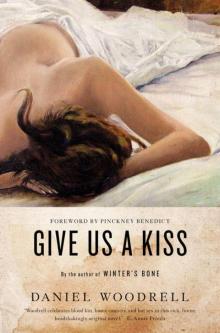 Give Us a Kiss: A Novel
Give Us a Kiss: A Novel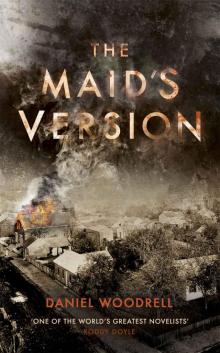 The Maid's Version
The Maid's Version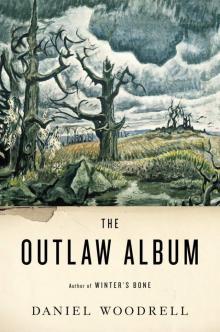 The Outlaw Album: Stories
The Outlaw Album: Stories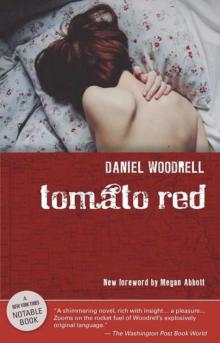 Tomato Red
Tomato Red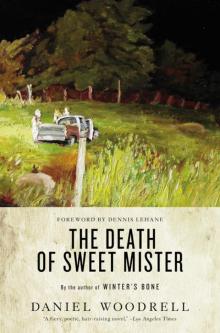 The Death of Sweet Mister
The Death of Sweet Mister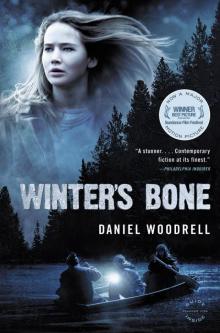 Winter's Bone
Winter's Bone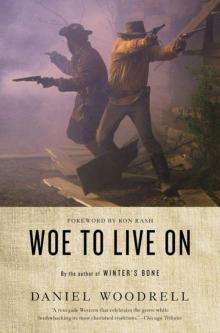 Woe to Live On: A Novel
Woe to Live On: A Novel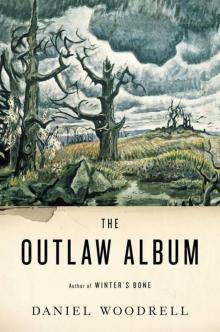 The Outlaw Album
The Outlaw Album